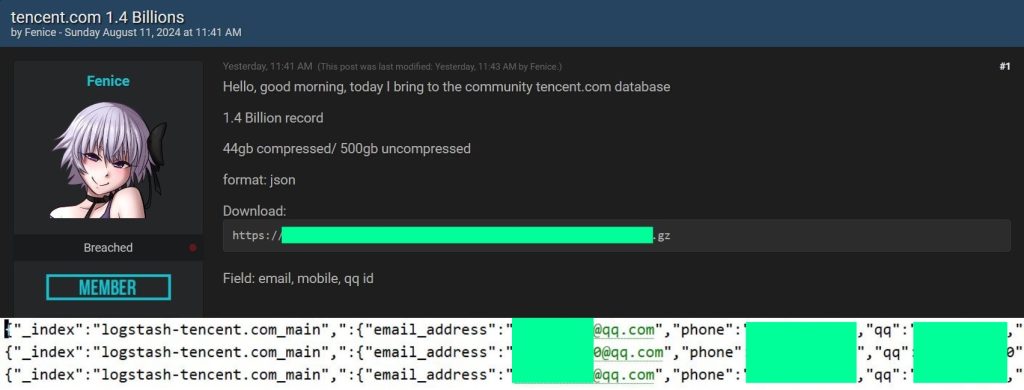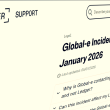Massive data leak exposes 1.4 billion Tencent user accounts. Leaked data includes emails, phone numbers, and QQ IDs potentially linked to the “Mother of All Breaches” (MOAB).
A threat actor named “Fenice” has leaked 1.4 billion user accounts which they claim belong to Tencent (Tencent.com), a Chinese internet giant and technology company. Tencent is widely recognized for its diverse range of services, including social networks, music streaming, web portals, e-commerce, mobile games, internet services, payment systems, smartphones, and multiplayer online games.
It is worth noting that Fenice is the same threat actor who, on August 6, 2024, leaked the personal data of 3 billion users breached from the background lookup platform National Public Data. This data included plain-text social security numbers (SSNs).
The Hackread.com research team suspects that this database originates from the “Mother of All Breaches” (MOAB), a massive data leak uncovered by cybersecurity researcher Bob Diachenko in January 2024. MOAB comprises over 26 billion records from 4,144 breaches, spanning 3,876 domains.
Some random 'Mother of All Breaches' #MOAB stats / interesting info, FYI:
— Bob Diachenko ?? (@MayhemDayOne) January 24, 2024
1) the total number of datasets in MOAB = 4145
2) out of it = 1448 have more than 100k records
3) out of it = 601 have more than 1M recs
4) 203 datasets have less than 100 recs
5) instance was updated in… pic.twitter.com/md2yZxW9Ig
These domains include well-known sites like LinkedIn, MySpace, Twitter, and Adobe, as well as various government organizations and public bodies including 1.5 billion accounts from Tencent, 504 million accounts from Weibo and 127 million accounts from Badoo among others.
What’s in the data?
According to the hacker, Tencent data includes 1.4 billion records, containing 44GB in compressed form and expanding to 500GB when uncompressed. The data is in JSON format and contains fields such as email, mobile numbers, and QQ IDs. The presence of timestamps and storage paths suggests that this data was processed on May 9, 2023.

Implications
The implications of this leak are significant, particularly due to the nature and volume of the data involved. Here’s a detailed analysis of the potential consequences:
1. Privacy Violations:
- Exposure of Personal Information: The leak includes sensitive personal information such as email addresses, phone numbers, and QQ IDs. This data could be exploited by malicious actors to invade users’ privacy, leading to identity theft, unauthorized access to other accounts, or targeted harassment.
- Increased Vulnerability to Phishing and Scams: The availability of both email addresses and phone numbers makes it easier for cybercriminals to craft convincing phishing emails or text messages, potentially tricking users into revealing further sensitive information or installing malware.
2. Reputational Damage:
- Tencent’s Trustworthiness: Tencent, being a major tech company, relies heavily on user trust. A data breach of this magnitude could severely damage its reputation, leading to a loss of user confidence in the company’s ability to protect its information.
- Impact on Business Partnerships: The leak might also affect Tencent’s relationships with other companies and governments, as partners may reconsider the security of collaborations involving Tencent’s platforms.
3. Financial Impact:
- Costs of Mitigation and Legal Penalties: Tencent might face substantial costs related to mitigating the breach, including enhancing security measures, providing support to affected users, and potentially paying legal fines, especially if the breach violates data protection regulations like the GDPR (if any European users are involved).
- Potential for Class-Action Lawsuits: If a large number of users are affected, Tencent could face class-action lawsuits, further increasing the financial burden.
4. Regulatory Scrutiny:
- Government Investigations: Regulatory bodies in China and other countries may launch investigations into the breach, potentially leading to stricter oversight and additional compliance requirements for Tencent.
- Strengthening of Data Protection Laws: This breach might prompt governments to revisit and strengthen data protection laws, increasing the regulatory burden on companies like Tencent to ensure the security of user data.
5. Increased Cybersecurity Risks:
- Secondary Attacks: The data from this breach could be used in secondary cyberattacks. For instance, cybercriminals could leverage email addresses and phone numbers to carry out brute-force attacks on other services, assuming that users might reuse passwords across platforms.
- Underground Market Exploitation: The leaked data could be sold on the dark web, where it could be used by other criminals for a variety of malicious purposes, further amplifying the damage to the affected individuals.
6. Impact on Users:
- Loss of Security for Affected Users: Users whose data has been exposed may need to take immediate action to secure their accounts, change passwords, and monitor their accounts for suspicious activity.
- Psychological Impact: Knowing that personal information has been exposed can cause significant stress and anxiety for the affected individuals.
7. Potential for Broader Cybersecurity Awareness:
- Increased Public Awareness: High-profile breaches like this can raise awareness about cybersecurity among the general public, leading to better personal security practices and more demand for secure digital services.









